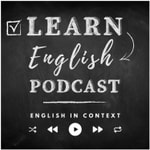Learn English Podcast – Détails, épisodes et analyse
Détails du podcast
Informations techniques et générales issues du flux RSS du podcast.

Learn English Podcast
Learn English Podcast
Fréquence : 1 épisode/9j. Total Éps: 80

Welcome to the Learn English podcast, the podcast teaching English in context so you can learn naturally. Each episodes presents comprehensible and engaging content in English so you can improve your listening comprehension, vocabulary, and knowledge about American culture. Ideal resource for intermediate or lower-advanced learners on their English journey. Let's learn English!
Classements récents
Dernières positions dans les classements Apple Podcasts et Spotify.
Apple Podcasts
🇫🇷 France - languageLearning
21/07/2025#89🇫🇷 France - languageLearning
02/06/2025#69🇨🇦 Canada - languageLearning
12/05/2025#97🇨🇦 Canada - languageLearning
10/05/2025#78🇨🇦 Canada - languageLearning
09/05/2025#90🇨🇦 Canada - languageLearning
08/05/2025#96🇬🇧 Grande Bretagne - languageLearning
07/05/2025#96🇩🇪 Allemagne - languageLearning
07/05/2025#80🇨🇦 Canada - languageLearning
06/05/2025#78🇬🇧 Grande Bretagne - languageLearning
06/05/2025#54
Spotify
Aucun classement récent disponible
Liens partagés entre épisodes et podcasts
Liens présents dans les descriptions d'épisodes et autres podcasts les utilisant également.
See all- https://www.reallifeghoststoriespodcast.com/
907 partages
- https://www.justwatch.com
317 partages
- https://www.justwatch.com/
184 partages
- https://www.youtube.com/@Thelinguist
5 partages
- https://www.youtube.com/@storylearning
5 partages
- https://www.instagram.com/deadwaxart
2 partages
Qualité et score du flux RSS
Évaluation technique de la qualité et de la structure du flux RSS.
See allScore global : 52%
Historique des publications
Répartition mensuelle des publications d'épisodes au fil des années.
E48 Learn English Podcast: How to Breakthrough the Intermediate Plateau and Improve Your English!
Épisode 48
lundi 23 septembre 2024 • Durée 21:59
⏳Are you stuck in your English learning journey? Have you been studying for years, but still struggle when speaking? Do you feel like you've stopped making progress and don't know what else to do?
📚You're not alone! Many language learners encounter this frustrating phase where progress seems to have stalled. On today's episode of the Learn English Podcast, we'll delve into the reasons behind this plateau and discuss effective strategies to overcome it. By using these strategies and selecting appropriate materials, you'll continue to grow and expand your English skills.
🎧Discover the importance of consistent practice, finding engaging content, and setting realistic goals. We'll also explore the benefits of seeking feedback from native speakers and utilizing technology to enhance your learning experience. Whether you're struggling with grammar, vocabulary, or speaking fluency, we'll equip you with the tools and strategies to break through this hurdle and achieve your language learning objectives. If you’ve been studying for a while and feel like your progress has stalled, this episode is for you. By the end, you’ll feel more confident about navigating the intermediate plateau and pushing yourself closer to fluency.
🔔 Follow us on social media @LearnEnglishPod and visit our website:
Podcast website: https://learnenglishpod.com/
Follow us on social Media: https://linktr.ee/learnenglishpod
📚Affiliate link for Lingq: https://www.lingq.com/?referral=msusc
Affiliate link for italki: https://tinyurl.com/LearnEnglishPod
📜 SOURCES
Steve Kaufmann: https://www.youtube.com/@Thelinguist
Stephen Krashen: https://www.sdkrashen.com/
Olly Richards: https://www.youtube.com/@storylearning
📝 Vocabulary List:
1) plateau: a period of little or no progress or improvement
2) intensive study: studying something with great effort and concentration
3) input hypothesis: the theory that language acquisition occurs through exposure to comprehensible input
4) polyglot: a person who knows and is able to speak several languages
5) opinion pieces: articles that express a person's thoughts and feelings on a particular topic
6) colloquial phrases: informal expressions used in everyday speech
7) metaphors: a figure of speech in which one thing is said to be another thing
8) analogies: a comparison between two things that are not obviously similar
9) young adult literature: books written for young adults
10) AI: artificial intelligence
E47 Learn English Podcast: Yes, American Schools Are Just Like the Movies!
Épisode 47
lundi 16 septembre 2024 • Durée 17:56
🎬Today, we're taking a closer look at one of the most iconic aspects of American life: schools. You've probably seen American high schools shown on TV shows and movies. But is that what American schools are really like? Are those portrayals accurate or just fiction? Are there really school cliques and awkward daily announcements?
🏫In this episode of the Learn English Podcast, we’re diving deep into the culture of U.S. schools and uncovering how accurate those Hollywood depictions are. From yellow school buses to high school football, we'll discuss all the things that you'll see (and won't see) on school campuses across the country.
🎧Whether you’ve always been curious about American school culture or just want to improve your English by learning in context, this episode is packed with useful vocabulary and cultural insights. Tune in to hear about what makes American schools unique and get a better understanding of how they compare to what you’ve seen on TV. With real-life stories and examples, this episode is a perfect way to boost your English skills while learning something new about U.S. culture.
🔔 Follow us on social media @LearnEnglishPod and visit our website:
Podcast website: https://learnenglishpod.com/
Follow us on social Media: https://linktr.ee/learnenglishpod
📝 Vocabulary list:
1) Depicted: shown or represented in a picture or description
2) Adolescence: the period of time when a young person is developing from a child into an adult
3) Pickup and drop-off zone: a place where people can pick up or drop off passengers
4) School district: a geographical area that is responsible for providing public education
5) K-9 /canine unit: a group of police dogs and their handlers
6) Cliques: small groups of people who spend time together
7) Marching band: a group of musicians who play instruments while marching
8) Cheerleaders: people who lead cheers and dances at sporting events
9) Pep rally: a meeting of students and teachers to encourage a sports team
10) Intercom / PA system: a system for communicating between different parts of a building
11) Bulletin: a notice or announcement
E38 How to Make English Part of Your Daily Routine and Improve Your Skills!
Épisode 38
mardi 4 juin 2024 • Durée 22:10
📖You've likely heard that how much you interacting with English is the key to learning it. The more you read, listen, and speak in English, the better your fluency will be. Therefore, you should aim to read and listen daily. But how do you this? How can you fit language learning into your busy schedule? What if you have limited time and resources?
🎧On today's episode of the Learn English Podcast, we answer these questions and help you see where you can add English into your daily schedule. The goal is to make simple changes that will produce a big result overtime. You want English to be a part of your daily routine so you start acquiring the language without even thinking about it. We go over five tips to help you do this so you can reach your fluency goals.
🔔 Follow us on social media @LearnEnglishPod and visit our website:
Podcast website: https://learnenglishpod.com/
Follow us on social Media: https://linktr.ee/learnenglishpod
📚Affiliate link for Lingq: https://www.lingq.com/?referral=msusc
📜 SOURCES
Steve Kaufmann: @Thelinguist
Stephen Krashen: https://www.sdkrashen.com/
📝 Vocabulary list:
1) blank stare (n. idiom): a facial expression showing that someone is confused or surprised and does not know what to say
2) polyglot (n.): a person who can speak several languages
3) brainstorm (v.): to think of a lot of ideas quickly
4) subconscious (adj.): not consciously thought about or planned
5) downtime (n.): free time when you are not working or studying
6) substitute (v.): to replace something with something else
7) dedicated (adj.): giving your full attention and effort to something
8) Chores (n): household tasks
9) relatively short (adj. phrase): comparatively short; not very long
10) commute (v.): to travel regularly between your home and your place of work or education
E37 The Fitness and Exercise Vocabulary You Need to Understand Native Speakers
Épisode 37
lundi 27 mai 2024 • Durée 17:28
🎧If you're tuning in as this episode goes live in May, you know that summer is just around the corner here in the Northern Hemisphere. With the warmer weather and longer days comes the pressure to get in shape. But don't worry, the Learn English Podcast is here to help!
⛱️That’s why in today's episode, we're diving into exercise and fitness vocabulary. We'll explore essential terms, common sayings, and idioms used in the context of physical activity, ensuring you can understand and engage in conversations about fitness like a native speaker.
🏋🏽♀️ You'll learn the key terms that differentiate between resistance training and cardio, the staples of any workout routine. We'll also explore common phrases used to describe someone's activity level, from the casual "working out" to the dedicated "gym rat." You might hear someone say they're "jacked" or "ripped" to describe a muscular physique, or "huffing and puffing" after a challenging workout. By the end of this episode, you'll be able describe your workout experiences and understand native speakers discussing fitness.
🔔 Follow us on social media @LearnEnglishPod and visit our website:
Podcast website: https://learnenglishpod.com/
Follow us on social Media: https://linktr.ee/learnenglishpod
📝 Vocabulary list:
1) Resistance training - Exercise that improves muscle strength by working against resistance.
2) Cardiovascular exercise (cardio) - Exercise that increases heart and lung activity.
3) Calisthenics - Exercises consisting of a variety of body-weight training.
4) Weightlifting - The activity of lifting heavy objects for exercise.
5) Exercise class - A group session led by an instructor for physical exercise.
6) Trainer (personal trainer): A professional who helps individuals create and implement an exercise routine. They provide guidance, motivation, and ensure proper form to avoid injury.
7) Jacked / Ripped / Swole / Buff / Yolked: These are all informal terms for someone who is very muscular. They are often used to describe men.
8) Trim / Tone: These terms describe a lean, fit physique, often used for women. "Trim" suggests a healthy weight and lack of excess fat. "Toned" implies well-defined muscles without being bulky.
9) Gym rat: This is a playful term for someone who goes to the gym very frequently and enjoys spending time there.
10) Soreness / Muscle soreness: This is the pain or discomfort you feel in your muscles after exercise, especially when you haven't been working out regularly.
11) In shape - Physically fit.
12) Out of shape - Not physically fit.
13) Huffing and puffing / Can't catch your breath / Out of breath / Winded: This idiom describes someone who is breathing heavily and with exertion, often because they are working out hard.
📜 SOURCES
E36 Improve Your English and Learn These Fun American Baseball Idioms
Épisode 36
lundi 13 mai 2024 • Durée 16:50
🎧Do you know what "America's pastime" is? Feel confused when a native speaker tells you that you "hit a home run"? Don't what it means to "play hardball" with someone? Don't worry, this episode of the Learn English Podcast is here teach you these baseball-inspired idioms so you can effectively communicate with an American English speaker!
⚾Baseball may not be your favorite sport, and you might never have even seen a game, but we are going to show you how to improve your English with these idioms! This episode of the Learn English Podcast will explain the history behind this phrase and many others. You'll learn about "ballpark figures" for rough estimates, and how someone who completely misses the mark is "not even in the ballpark." You'll discover how the levels of professional baseball leagues inspire idioms like "major leagues" or "big leagues" to describe someone who's reached an elite position.
🗣️Mastering these baseball-inspired idioms isn't just about learning new words - it's about tapping into the cultural references that native English speakers use to communicate. The more you familiarize yourself with these turns of phrase, the more naturally you'll be able to engage in fluid, idiomatic conversations. Whether you're a baseball fan or simply want to expand your English vocabulary, this episode of the Learn English Podcast will help you on your English journey.
🔔 Follow us on social media @LearnEnglishPod and visit our website:
Podcast website: https://learnenglishpod.com/
Follow us on social Media: https://linktr.ee/learnenglishpod
📝 Vocabulary list:
1) Idioms - A group of words established by usage as having a meaning not deducible from those of the individual words.
2) Baseball - A game played with a bat and ball between two teams of nine players, each taking turns to field and bat.
3) Ballpark figure - A rough numerical estimate or approximation.
4) Rough estimate - An approximate calculation or judgment of the value, number, quantity, or extent of something
5) Stadium - A large, typically open-air, structure with tiers of seats for spectators at sports events.
6) Not even in the ballpark - Way off from the estimation; completely different.
7) Hit it out of the park / Knocked it out of the park - To do something extremely well or successfully.
8) Hit a homerun: to do something very well; to succeed completely
9) Major League Baseball (MLB) - The highest level of professional baseball in the United States and Canada.
10) Minor League - A baseball league of a level below that of Major League Baseball.
11) Elite - A select part of a group that is superior to the rest in terms of ability or qualities.
12) Prestigious: having a reputation for being very good or important
13) Playing hardball : to adopt a tough, aggressive, and unyielding approach to negotiations, discussions, or dealings
E35 A Guide To The Public and Private College and University System In America
Épisode 35
lundi 6 mai 2024 • Durée 25:13
🎓It's May, and that means it's college graduation season here in the United States. In today's episode, we're going to talk about the American higher education system and the different college and university options that exist here. Have your ever heard of a community college is? Know the difference between a two-year and a four-year college? Ever wondered how much American colleges and universities actually cost?
✨Our system might be different from what you're used to, but don't worry, we'll cover all of the basics! In the US, after high school, students have the option to continue their education at a college or university. In this episode, we'll discuss the different types of institutions, like community colleges, state universities, and private universities.
🎧Join us as we explore the differences between these institutions and understand why students make the choices they do. Whether you're considering studying in the US or just curious about our education system, this episode will help you learn more about American college culture.
🔔 Follow us on social media @LearnEnglishPod
Podcast website: https://learnenglishpod.com/
Follow us on social Media: https://linktr.ee/learnenglishpod
📝 Vocabulary list:
1) Graduation season: The time period when colleges and universities hold commencement ceremonies for graduating students.
2) Higher education: Education that takes place after high school, typically at a college or university. This includes undergraduate and postgraduate studies.
3) Chaotic: Disorderly or confused.
4) Public institution: A college or university that is funded by the government, generally resulting in lower tuition fees compared to private institutions.
5) Private institution: A college or university that is not funded by the government and relies on private funding sources, leading to higher tuition fees.
6) Senior year: The final year of high school.
7) Tuition: The cost of attending a college or university for the academic instruction itself.
8) Associate's degree: A two-year degree awarded by community colleges.
9) Bachelor's degree: A four-year degree awarded by colleges and universities.
10) Semester: One half of an academic year, typically lasting around 15-18 weeks.
11) Financial aid: Money provided by the government, colleges, or organizations to help students pay for tuition.
12) Competitive: A college or university that is difficult to get into due to a high number of applicants.
13) Elite: A highly prestigious university.
https://www.lacc.edu/cost-tuition/costs-college
https://www.calstatela.edu/financialaid/2023-2024-cost-attendance
https://admission.ucla.edu/tuition-aid/tuition-fees
https://financialaid.usc.edu/undergraduate-financial-aid/cost-of-attendance/
E34 Intermediate English: How to Talk About Past and Future Event Dates
Épisode 34
lundi 29 avril 2024 • Durée 14:45
🕰️Are you confused about talking about time in English? Do you struggle to say if something happened in the past, present, or future? Do you understand the difference between "a year ago", "in the last year", "next year", and "within the next year?"
🎧Don't worry! This episode of the Learn English podcast is here to help! As someone who teaches English online to non-native speakers, I often encounter confusion when it comes to discussing past and future events. But don't worry, I'm here to guide you through it. We'll explore how native speakers express when things happened or will happen, so you can communicate more effectively in English.
🗣️This episode will give you different phrases you can use to talk about past and future events, depending on when they are occurring. We'll cover saying like "ago," "last," and "in the past" to talk about the past. You'll also learn how to use "this," "next," and "in the next" to discuss future events. You'll learn which to use depending on whether you have a specific date in mind or a general timeframe.
🔔 Follow us on social media @LearnEnglishPod and visit our website:
Podcast website: https://learnenglishpod.com/
Follow us on social Media: https://linktr.ee/learnenglishpod
📝 Vocabulary list:
1) Demarcate: To set the boundaries or limits of; separate or distinguish.
2) Clarify: To make (a statement or situation) less confused and more comprehensible.
3) Decade: A period of ten years.
4) Century: A period of one hundred years.
5) Millennium: A period of one thousand years.
Talking about the Past
- yesterday - the day before today
- a go - used with numbers of days, weeks, months, etc. to indicate how long ago something happened (e.g., three weeks ago)
- this past - refers to a recent time period (e.g., this past week)
- last - used with specific days of the week, months, seasons, holidays, or years (e.g., last Friday, last month)
- in the last - used for longer periods in the past, often when something started in the past and continues to the present (e.g., In the last 20 years, technology has changed rapidly)
Talking about the Future
- this - refers to the current week, month, season, or year (e.g., This Friday, I'm going to the movies)
- next - refers to the following week, month, or year (e.g., Next summer, we're planning a trip to Europe)
- in/within - used with "the next" for a general timeframe in the future (e.g., In the next few days, I'll call my mom)
- from now - used with a number and a unit of time (e.g., Three weeks from now, we're moving)
E33 English Lesson: Understanding the History and Impact of Earth Day
Épisode 33
lundi 22 avril 2024 • Durée 15:11
🎧Welcome back to the Learn English Podcast, where we explore the English language in real-life contexts, helping you learn naturally. As we release this episode on April 22nd, it's Earth Day—a global celebration observed in 190 countries. Earth Day encourages community involvement to address environmental challenges and raise awareness about our planet's well-being. Today, we discuss the history of Earth Day, its significance on April 22nd, and its global observance.
🌎Learn about the origins of Earth Day in the 1960s, a decade marked by societal movements like civil rights, anti-war protests, and the emergence of environmental activism. Discover the impact of the first Earth Day in 1970, which mobilized millions, leading to legislative action such as the establishment of the Environmental Protection Agency and important environmental laws. Explore how Earth Day continues to evolve, uniting communities worldwide in environmental advocacy.
🗣️Listeners will not only gain a deeper appreciation for the history and legacy of Earth Day, but will also have the opportunity to expand their English vocabulary and listening comprehension skills. Learn useful words and phrases related to environmentalism, activism, and more.
🔔 Follow us on social media @LearnEnglishPod and visit our website:
Podcast website: https://learnenglishpod.com/
Follow us on social Media: https://linktr.ee/learnenglishpod
📝 Vocabulary list:
1) raise awareness (v): to make people more conscious or knowledgeable about something
2) environmental issues (n): problems that harm the environment
3) turbulent (adj): characterized by a lot of change or conflict
4) grassroots (adj): involving ordinary people rather than those in positions of authority
5) resounding success (n): a very successful event
6) rally (n): a public meeting at which people express their opinions or support for a cause
7) demonstration (n): a public expression of protest or support
8) cleanup effort (n): an activity in which people clean up a dirty or untidy place
9) beautify (v): to make something look more attractive
10) emissions (n): harmful gases or particles that are released into the atmosphere
📜 SOURCES
https://www.theguardian.com/us-news/2024/feb/09/trump-epa-plan-environment
https://www.eenews.net/articles/conservatives-gear-up-for-epa-revamp-in-2025/
E32 Everyday English: How to Talk About Dates and Time In American English
Épisode 32
lundi 15 avril 2024 • Durée 15:41
🤔Are you confused about how to write dates and tell time in American English? Do you know when to use 5/5, May 5th, and the 5th of May? Even though those are all referring to the same date, you would use them in different contexts. For English learners, it's difficult to know when and how to use them.
🎧 Don't worry, this episode of the Learn English Podcast is here to help! We'll discuss the unique conventions used in the US compared to other English-speaking countries. You'll learn the correct format for writing dates, including how to use numbers and ordinal numbers. We also cover how to say the date out loud and how Americans typically express time using am/pm.
📅Understanding these nuances will help learners sound more natural when discussing schedules and appointments. Even if you're familiar with the basics, this episode dives into some interesting details. By the end, you'll feel confident navigating dates, days of the week, and time in everyday American English conversations.
🔔 Follow us on social media @LearnEnglishPod and visit our website:
Podcast website: https://learnenglishpod.com/
Follow us on social Media: https://linktr.ee/learnenglishpod
📝 Vocabulary list:
1) slash: a diagonal line (/) used in writing to separate things
2) ordinal form: a number used to indicate position in a sequence (e.g., first, second, third)
3) imply: to suggest something without saying it directly
4) military time: a 24-hour clock system
5) incorporate: to include something as a part of something else
6) Capitalized: Written with the first letter as a capital letter.
7) figure out: to understand something
8) Rigid: Firm or inflexible.
9) hurry: to cause someone to move or act more quickly
10) invitation: a formal request for someone to come to an event
E31 Become a More Fluent English Speaker: How To Talk About Being Ignored
Épisode 31
lundi 8 avril 2024 • Durée 16:09
📚Do you ever feel like you have a limited vocabulary? Feel frustrated about not being to express yourself or sound like a native English speaker? Ever wish you could just ignore these problems?
💫On today's episode of the Learn English Podcast, we discuss the different synonyms for the word "ignore". We discuss the differences between "ignore", "disregard", "dismiss", and "tune out", while giving you some helpful idioms that you can use to improve your English vocabulary and sound more like a native. Make sure to give your full attention to this episode to improve your fluency in English!
🔔 Follow us on social media @LearnEnglishPod and visit our website:
Podcast website: https://learnenglishpod.com/
Follow us on social Media: https://linktr.ee/learnenglishpod
📝 Vocabulary list:
1) ignore: general term for not listening or paying attention
2) nuance: subtle difference
3) precise: exact
4) disregard: formal, not considering something important
5) dismissive/dismissing: formal, treating something as unimportant
6) brush off : casual, ignoring someone or something unimportant
7) not paying attention: neutral, simply not focused on something
8) tune out: gradually stop paying attention, can be intentional or unintentional
9) pretend: act as if something is true although it is not









